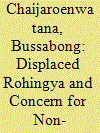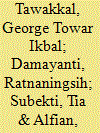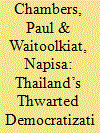|
|
|
Sort Order |
|
|
|
Items / Page
|
|
|
|
|
|
|
| Srl | Item |
| 1 |
ID:
175406


|
|
|
|
|
| Summary/Abstract |
Since the Reform Era began in 1998, a democratization process has taken place in Indonesia. By assessing the three elements of state, economy, and society, and the evolution of their interactions, this study concludes that Indonesia’s contemporary political condition has been shaped by a continuously strong and dominant state, increased participation of society, and the adoption of the developmental state model. The state remains a dominant actor since a strong presence and role of the state continues to be sustained by the elites to maintain power. Society’s demands to receive government assistance have deepened the state’s role. While in the past the state was heavily supported by the military, today, the presence of the military within the democratic system has significantly diminished and been replaced by different economic actors. The elites are more dependent on support from society to remain in power and to implement policies that are generally achieved through economic incentives. Public participation appears in a majority of social, economic, and even political affairs, mainly to fulfill the requirement of being democratic. As for the economy, its role is becoming larger and has increasingly been used to replace the coercive power approach.
|
|
|
|
|
|
|
|
|
|
|
|
|
|
|
|
| 2 |
ID:
175411


|
|
|
|
|
| Summary/Abstract |
Using a Human Security approach, this study examines Rohyinga refugees in Thailand. The Myanmar government’s refusal to offer the Rohingya citizenship has rendered them effectively stateless, denied basic rights and protections. Myanmar’s 1982 Citizenship Law was created in the name of indigenous ethnicity to deny nationality to the Rohingya. Myanmar’s military has repressed and massacred Rohingya on several occasions, most notably in 2012 and 2017. Consequently, more than a million Rohingya have fled abroad, with a relatively small number going to Thailand. The purpose of this study is to examine how the Thai government treats the displaced Rohingya and to what extent that the Rohingya pose a security risk for Southern Thailand. After intensive field work and meeting with different stakeholders, this paper argues that Thailand is not a popular destination for Rohingyas but they have generally been brought to or through Thailand by human traffickers. Due to a lack of documents, Thai authorities have often sent Rohingya to detention centers or deported them. This study did not find any link between displaced Rohingya and Malay Muslim insurgents. However, there is no consistent policy from the Thai government to deal with the displaced Rohingya.
|
|
|
|
|
|
|
|
|
|
|
|
|
|
|
|
| 3 |
ID:
175403


|
|
|
|
|
| Summary/Abstract |
Western liberal democracy is in crisis. At the same time, since the end of the Cold War, new regions of the world and actors have risen to prominence. Contemporary discourse emphasizes, in particular, the rise of East Asia (including the Northeast and Southeast Asian sub-regions) and the empowerment of middle powers. This Special Issue of Asian Affairs: An American Review looks at the extent to which mid-sized East Asian states with significant democratic heritage embody hope for the liberal democratic project, and also the challenges they face. Furthermore, it considers how the analysis of the mode of interaction between state, economy and society allows a determination of the democratic conditions of any given country. The articles in this Special Issue originate from a project supported by the Asia Pacific department of the Friedrich Ebert Stiftung (FES) exploring regional interdependencies of democratization in Asia. This introduction explores the theoretical framework of the project and elaborates further on case selection.
|
|
|
|
|
|
|
|
|
|
|
|
|
|
|
|
| 4 |
ID:
175408


|
|
|
|
|
| Summary/Abstract |
In 2018, Malaysia saw a change of ruling parties for the first time since its independence. Malaysian democracy however, remains monopolized by the ruling elites and dominated by a strong state. This paper looks at the multidimensional relations between state, economy and society that characterize the Malaysian democracy and is divided into five thematic sections. Firstly, the key characteristics of Malaysia’s state, society and economy are discussed. Secondly, the paper looks at some of the main historical and transformative features of Malaysia’s modern statehood including the colonial experience under the British, which institutionalized race-based politics as well as the government’s overhaul of its economic and social policies in response to conflict in the late 1960s. The third section looks at some major factors that shape the politics of Malaysia, specifically the factors that contributed to BN’s long hold on power. Section four of the paper looks at the major shifts in the relations between state, society and economy and its impact on Malaysian democracy. Finally, the fifth section assesses the challenges and prospect of the country since the change in ruling parties.
|
|
|
|
|
|
|
|
|
|
|
|
|
|
|
|
| 5 |
ID:
175407


|
|
|
|
|
| Summary/Abstract |
The Philippines is Southeast Asia’s oldest democracy. Yet democratic institutions fail to show coherence in what is largely seen as a resilient oligarchical state that manages to control the state, economy, and society by constantly adapting and shifting along with the political contours. Despite its rich democratic tradition, the country has not been able to reduce centuries old socio-economic inequalities that have sustained clientelistic politics. The continuing failure to consolidate and deepen democracy has negatively impacted the Philippine state, the economy and society. This country study charts the various structural and institutional arrangements and accommodations that have resulted in the country’s defective democratization. Using historical and contemporary process tracing, this study hopes to provide a nuanced understanding of the democratic and not so democratic trajectory that the country continues to experience. By providing a mapping of the defective democracy in the Philippines, this study provides a lens to see the conditions, depth and alterations within the course of pursuing democratization. The distinct and complementing structural and institutional arrangements over the years illustrate how power can lead to various patterns of domination and transformation.
|
|
|
|
|
|
|
|
|
|
|
|
|
|
|
|
| 6 |
ID:
175410


|
|
|
|
|
| Summary/Abstract |
In a world of globalized markets, sizeable core states gain greater benefits from economic integration. Small peripheral states generally increase in trade incomes yet at cost of sovereignty and agenda decisions. Recent studies in the field of political economy have demonstrated that concerted economic integration efforts actually lead to disproportional gains for bigger powers at the expense of smaller neighboring states. This differential in integration benefits results in political disintegration for the latter.1 In the case of Asia Pacific, Taiwan is situated at the forefront of regional superpower China’s unification campaign. We examine the history of Taiwan’s cross-Straits relations highlighting its experience with China’s various forms of power. For other smaller states in the region, what lessons can be learnt from Taiwan’s experience in the last few decades characterized by China’s “peaceful ascendance” and regional bloc initiative? We suggest that Taiwan serves as a reference for other states in the region. We discuss on the implications of China’s economic integration projects, such as the Belt and Road Initiative (BRI) and the role of Taiwan in the political economy of regional relations. Not only can its experience provide reference data for other small states like canary in the mines,2 but it can also be a facilitator of synergetic strategies among smaller state to broker new possibilities under China’s expansive influence.
|
|
|
|
|
|
|
|
|
|
|
|
|
|
|
|
| 7 |
ID:
175412


|
|
|
|
|
| Summary/Abstract |
This manuscript examines the role of intermediaries known as “brokers” in mobilizing voters, often by distributing cash and material goods, for campaigns in Indonesia. We build upon previous studies by examining the role of social networks in recruiting brokers into campaigns, the structure of brokerage networks, and the motivations of brokers to join a campaign. Whereas past studies tend to view the candidate-broker relationship in transactional terms, our study finds that the social network of candidates is also an important factor that helps explain how brokerage networks are structured and also the considerations that motivate brokers to work for a campaign. While material benefits and transactional considerations do motivate some brokers, we also find a wide variety of solidary benefits such as personal friendships and shared membership in social organizations as motivating factors for many other brokers. Our findings are based on in-depth interviews with approximately 150 individuals (candidates, brokers, citizens, etc.) during the 2017–2019 series of Indonesian elections which includes local village head elections, legislative elections, and the gubernatorial election.
|
|
|
|
|
|
|
|
|
|
|
|
|
|
|
|
| 8 |
ID:
175404


|
|
|
|
|
| Summary/Abstract |
From a developmental perspective, South Korea would seem to have long ago put the challenges of the Middle Income Trap behind it. This supposed economic Miracle on the Han River has been matched by a similar political miracle with democratic transition followed by consolidation. Yet middle income economic conceptualization is too narrow, with contemporary observers taking into account the political economy of change as well, emphasizing how development paths are often the outcome of a struggle between those who benefit from the status quo and those who seek change “ a broader Transformation Trap. Likewise, even after transition and consolidation, the quality of democratic governance can remain poor, or thin. In South Korea, as with many Asian societies, the balance of power is tilted in favor of forces preserving the status quo. This article examines South Korea's escape from the developmental Transformation Trap through the interplay of state and the economy. It considers state-society achievements as well as ongoing challenges of the political Transformation Trap. It concludes with ongoing and future challenges along the economy-society nexus.
|
|
|
|
|
|
|
|
|
|
|
|
|
|
|
|
| 9 |
ID:
175405


|
|
|
|
|
| Summary/Abstract |
Since the lifting of martial law in 1987, Taiwan has progressed toward one of Asia’s most advanced democracies. This paper looks at the historical and socio-political circumstances and traces the global and domestic factors behind the transformation. Assuming that advanced levels of democratic governance can only be obtained through mediated social control over the state and the economy, the study explores whether democratic values and norms have become internalized and identifies the current caveats of further democratic development. More specifically, the paper argues that although Taiwan’s democratization has been caused by external sovereignty-related factors, the discourse on national identity has repoliticzed the public political realm after decades of authoritarianism and led to the habitualization of democratic values and norms. The paper concludes with an assessment of the prospects for comprehensive and inclusive public participation in the shaping of Taiwan’s political conditions.
|
|
|
|
|
|
|
|
|
|
|
|
|
|
|
|
| 10 |
ID:
175409


|
|
|
|
|
| Summary/Abstract |
In 2019, Thailand represents the case of an Asian country overshadowed by authoritarian forces, though it has time and again experienced attempts at democratization. This paper argues that democracy remains deficient in Thailand because, though there have been enormous advances in terms of the economy, social improvements and state stability, political space remains elusive and dominated by the monarchy and military. State formation in Thailand is a function of how entrenched social stratification has been reflected in a highly skewed distribution of economic resources. The paper asks the following five questions: First, why has Thailand, which appears to have become relatively strong in terms of economic and political stability, been unable to achieve democracy? Second, what has been the evolution of democracy versus authoritarianism in Thailand? Third, how have the linkages among state structures, economic relations and societal institutions evolved across time in Thailand? Fourth, what are the main features of their historical development today and how have these (as conditioned by domestic and international factors) affected Thailand’s political conditions? Fifth, what is the likely future of Thai democracy?
|
|
|
|
|
|
|
|
|
|
|
|
|
|
|
|
|
|
|
|
|